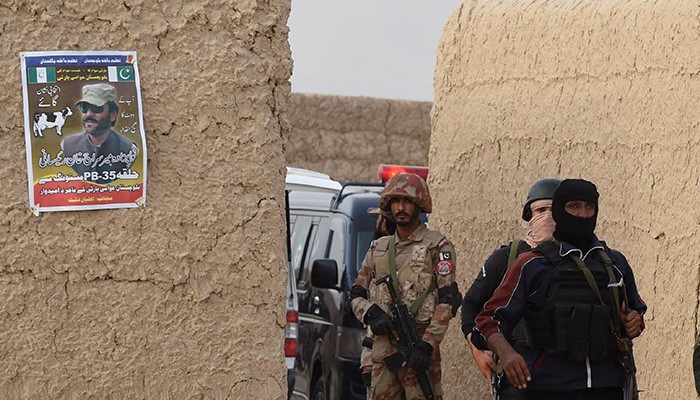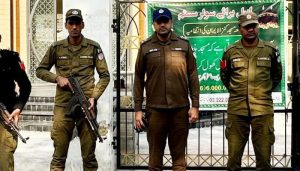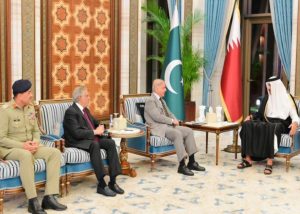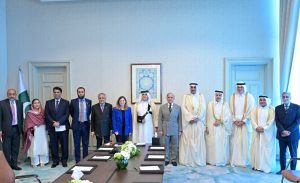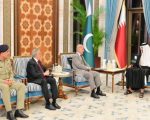ISLAMABAD – The close relatives of the suicide bomber, who targeted election rally in Mastung area of Balochistan in July, are undergoing training in Afghanistan for more attacks in Pakistan, it has emerged.
According to an intelligence notification obtained by think tank Islamic Theology of Counter Terrorism, Pakistani intelligence believes that family members of Hafeez Nawaz aka Abu Bakr al-Bakistani, the Islamic State (IS) suicide bomber who targeted the rally of Siraj Raisani and martyred 149 people, are in Afghanistan with nefarious designs.
The report says the remaining family of Hafeez Nawaz is currently in an unknown location in Afghanistan at an ISKP training camp where they are planning to carry out more suicide missions in Pakistan.
ITCT also revealed that the relatives include 56-year-old mother, Bibi Zareen Jan, 29-year-old brother Abdul Aziz Nawaz and 19-years-old brother Shakoor Nawaz of Hafeez Nawaz to be in Pakistan’s Western neighboring state.
Maryam, Aisha, Samiya, and Safiya are four sisters of Hafeez Nawaz and their photos are not available

On 13th July 2018 during the election campaigning in Pakistan, a major suicide bombing claimed by Islamic State Khorasan (ISKP) group marred the election process in the war-battered province of Balochistan. The suicide bombing targeted campaign rally of a pro-government politician Siraj Raisani, who was left martyred in the attack.
Following the attack, Islamic State Khorasan (ISKP) group claimed responsibility via the Amaq Agency, the official propaganda channel of IS. Amaq also released the image of the masked suicide bomber named Abu Bakr al-Bakistani, whose facial features match those of Hafeez Nawaz, the man identified by Pakistani authorities as the Pakistani citizen who carried out the bombing. This confirms that Hafeez Nawaz and Abu Bakr al-Bakistani are indeed the same person.
One of Hafeez Nawaz’s brothers and his father were arrested by Pakistan’s Counter-Terrorism Department (CTD) in August from Banaras area of Karachi city; his father is named Muhammad Nawaz and his arrested brother is named Haq Nawaz.
During the initial probe, Muhammad Nawaz told police that his three sons (including Mastung bomber Hafeez Nawaz), his wife and four daughters had moved to Afghanistan on May 29. He told the police that initially his ‘suicide bomber’ son was associated with Tehrik-e-Taliban Pakistan’s Fazlullah group, but later on he joined ‘Daud Mehsud group’ and then finally he was recruited by Islamic State.
https://en.dailypakistan.com.pk/headline/nawabzada-siraj-raisani-among-dozens-injured-in-mastung-blast/
Moreover, two other accomplices of Hafeez Nawaz were also arrested in the same operation identified as Sheeraz alias Saifullah and Wali Ahmed alias Abu Ubaid. Both were identified as members of Jaish al-Adl group, which targets Iranian interests and recently kidnapped a dozen Iranian border guards from Iran-Pakistan border confirming the interlinkages between TTP, Jaish al-Adl and Islamic State.
The family of Hafeez Nawaz originally hailed from Molia village in Abbottabad but Hafeez Nawaz himself was a resident of Gharibabad Mohalla in Dhabeji, Thatta.
He had studied at an Islamic seminary in Karachi city’s Shah Faisal Colony for three years where he drifted towards militancy; a few of his colleagues at the seminary motivated him towards militancy and allegedly sent him to Afghanistan. Two of his Jaish al-Adl associates also studied there with him.
According to his father, his three daughters, who had been shifted to Afghanistan, were ‘Alima’ (religious scholars) and two of them had married IS militants there. His other two sons, Abdul Aziz and Abdul Shakoor, were also living in Afghanistan and Shakoor recently told his father that now “it’s his turn” to become a suicide bomber.
Hafeez Nawaz’s father along with his son used to sell milk and vegetables in the Dhabeji area.
As per the report of the think tank, the Pakistani intelligence said the father of suicide bomber did not show any remorse or sadness on realizing that his son had carried out a suicide attack in Mastung.
Hafeez Nawaz
Hafeez Nawaz was recruited by Islamic State Khorasan (ISKP) group while he was working for TTP’s Haji Daud group.
Haji Daud, also known as Daud Policewala, was a policeman in Karachi till mid-2000. He was then appointed as the city chief of the banned Tehrik-e-Taliban Pakistan (TTP) by now slain Mullah Fazlullah. Haji Daud later developed differences with Mullah Fazlullah and joined the Islamic State Khorasan (ISKP) group. He was also reportedly injured in a clash with TTP militants in Afghanistan.
Using forensics, Pakistani intelligence concluded that Hafeez Nawaz had arrived in Chaman, Pakistan from Afghanistan on June 29 and was also in touch with at least nine persons, including three belonging to Sindh. He later relocated to Qila Abdullah and subsequently to Mastung, where he finally carried out the suicide attack on Siraj Raisani’s election gathering.
After the Mastung attack, Pakistani security forces and intelligence agencies neutralized the Balochistan emir of IS, identified as Mufti Hidayatullah al-Balochi, in a counter-terrorism operation as the agencies believed him to be the mastermind of Mastung suicide bombing.
In September, Islamic State released issue no. 146 of its weekly al-Naba magazine, which featured a tribute article on Mufti Hidayatullah al-Balochi.
Just two days before the Mastung suicide bombing, Pakistani security institutions released multiple threat alert notifications warning of possible bombings and assassinations.
The existence of IS in Pakistan was confirmed by a police officer as in 2015, during a parliamentary panel briefing, Inspector General Police (IGP) Sindh Ghulam Hyder Jamali admitted that IS is active in Sindh province.
“All intelligence agencies and security forces were on the same page to eradicate terrorism from Sindh, which had resulted in an 80% drop in terror attacks and a 53% decline in targeted killings,” he had said.
A report on 2017 terrorist activity in Pakistan issued by Islamabad-based think tank Pakistan Pakistan Institute for Peace Studies (PIPS) earlier this year in January revealed that IS activity is on the rise across Pakistan, and in northern Sindh in particular.
“In 2017, IS claimed as many as six deadly attacks, in which 153 people were killed, across Pakistan,” the report stated.

